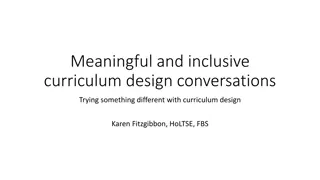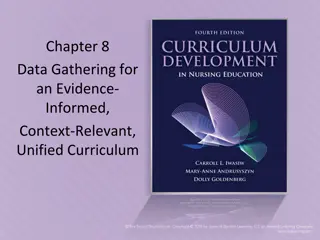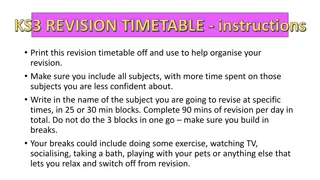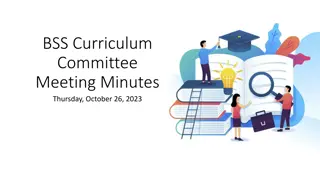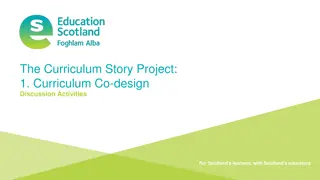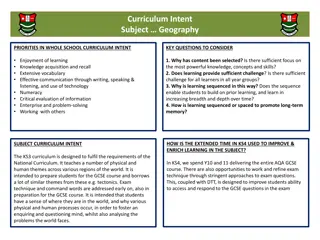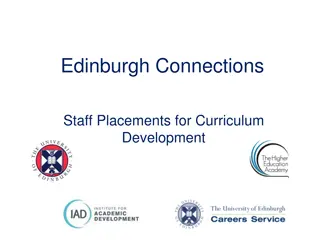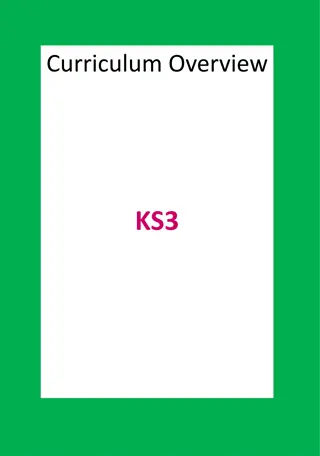Design and Technology Curriculum Overview for KS3
This curriculum overview for Design and Technology at KS3 level covers various topics such as Resistant Materials, Textiles Technology, and Food Technology. Students will learn to design, make prototypes, and analyze outcomes with a focus on practical skills and technical knowledge. The curriculum includes elements of sustainability, creative design thinking, and safe working practices in a structured 13-week format for Year 7 and Year 8 students.
Download Presentation

Please find below an Image/Link to download the presentation.
The content on the website is provided AS IS for your information and personal use only. It may not be sold, licensed, or shared on other websites without obtaining consent from the author. Download presentation by click this link. If you encounter any issues during the download, it is possible that the publisher has removed the file from their server.
E N D
Presentation Transcript
Technology Technology curriculum overview KS3 overview KS3 curriculum
Design Technology curriculum overview Design Technology curriculum overview Year 7 (KS3) Year 7 (KS3) DT 1 Resistant Materials Storage box DT 2 Textiles Technology Fibre to Fabric DT 3 - Food Technology Cooking skills / Healthy eating Topic Length of topic 13 Weeks 13 Weeks 13 Weeks AO2- Design and make prototypes that are fit for purpose. AO3- Analyse and evaluate: design decisions and outcomes, including for prototypes made by themselves and others. AO1 Identify, investigate and outline possibilities to address needs and wants. AO2- Design and make prototypes that are fit for purpose. AO3- Analyse and evaluate: design decisions and outcomes, including for prototypes made by themselves and others. Wider issues in Design Technology. AO4 Demonstrate and apply knowledge and understanding of Technical principles and design and making principles. AO1- Demonstrate knowledge and understanding of food, cooking and nutrition. AO2- Apply knowledge and understanding of food, cooking and nutrition. Links to specification Assessment of the finished make using the staged criteria from the Trust Specification. Assessment of design work using the staged criteria from the Trust Specification. Assessment of technical knowledge using the staged criteria from the Trust Specification. Assessment of the finished make using the staged criteria from the Trust Specification. Assessment of prepared dishes using the staged criteria from the Trust Specification. Assessment of planning and designing dishes using the staged criteria from the Trust Specification. Assessment Task(s) Material categories, (wood and boards) properties and origins. The environment, sustainable resources. Material finishes . Developing Design Ideas. Material categories, (Textiles) properties and origins. Analysing and evaluating prototypes. Health & Safety Identifying tools and equipment Food hygiene/storage Enzymic Browning How to follow a recipe Understanding an investigation Key Knowledge Health and Safety, good practice. Working with tools, materials and workshop machinery. Marking and measuring. Organisation, time keeping. Taking pride in the presentation of work Basic sewing techniques. Operating the sewing machine. Taking pride in the presentation of work. Use of tools and equipment 3D Modelling Knife skills Hygiene and cleaning Organisation Oven use and safety Key Skills
Design Technology curriculum overview Design Technology curriculum overview Year 8 (KS3) Year 8 (KS3) DT 1 Resistant Materials Whizzer DT 2 Textiles Technology Working with Fabric DT 3 - Food Technology World Foods Topic Length of topic 13 Weeks 13 Weeks 13 Weeks AO2- Design and make prototypes that are fit for purpose. AO3- Analyse and evaluate: design decisions and outcomes, including for prototypes made by themselves and others. Wider issues in Design Technology. AO1 Identify, investigate and outline possibilities to address needs and wants. AO2- Design and make prototypes that are fit for purpose. AO3- Analyse and evaluate: design decisions and outcomes, including for prototypes made by themselves and others. AO4 Demonstrate and apply knowledge and understanding of Technical principles and design and making principles. AO1- Demonstrate knowledge and understanding of food, cooking and nutrition. AO2- Apply knowledge and understanding of food, cooking and nutrition. AO4- Analyse and evaluate different aspects of food, cooking and nutrition, including food made by themselves and others. Links to specification Assessment of the finished make using the staged criteria from the Trust Specification. Assessment of design work using the staged criteria from the Trust Specification. Assessment of technical knowledge using the staged criteria from the Trust Specification. Assessment of the finished make using the staged criteria from the Trust Specification. Assessment of prepared dishes using the staged criteria from the Trust Specification. Assessment of planning and designing dishes using the staged criteria from the Trust Specification. Assessment Task(s) Material categories, (wood and boards) properties and origins. The environment, sustainable resources. Material finishes . Developing Design Ideas. Rendering, Isometric drawing. Materials and their properties. Understanding of different standard components used in textile products. Understanding of Computer Aided Design and Computer Aided Manufacture. Sustainability - The 6 R Functions of ingredients in bread Predicting in food science Understanding world dishes and British fusion Key Knowledge Health and Safety, good practice. Working with tools, materials and machinery. CAD Skills. Developing practical skills. Pattern making. Taking pride in the presentation of work. Health and Safety, good practice. Working with tools, materials and workshop machinery. Assembling more complex components. Marking and measuring. Organisation, time keeping. Developing design skills. Exploring a theme. Taking pride in the presentation of work. Using the hob/frying Sauce making Independently following a recipe using hygiene and safety Working to a time plan Plan an experiment Key Skills
Design Technology curriculum overview Design Technology curriculum overview Year 9 (KS3) Year 9 (KS3) DT 1 Product Design Mechanical Toy DT 2 Textiles Technology Iconic Pencil Case Project DT 3 - Food Technology Diet/Food science Topic Length of topic 13 Weeks 13 Weeks 13 Weeks AO2- Design and make prototypes that are fit for purpose. AO3- Analyse and evaluate design decisions and outcomes, including for prototypes made by themselves and others. Wider issues in Design Technology. AO1 Identify, investigate and outline possibilities to address needs and wants. AO2- Design and make prototypes that are fit for purpose. AO3- Analyse and evaluate: design decisions and outcomes, including for prototypes made by themselves and others. Wider issues in Design Technology. AO4 Demonstrate and apply knowledge and understanding of Technical principles and design and making principles. AO1- Demonstrate knowledge and understanding of food, cooking and nutrition. AO2- Apply knowledge and understanding of food, cooking and nutrition. AO3- Plan, prepare, cook and present dishes, combining appropriate techniques. AO4- Analyse and evaluate different aspects of food, cooking and nutrition, including food made by themselves and others. Links to specification Assessment of the finished make using the staged criteria from the Trust Specification. Assessment of design work using the staged criteria from the Trust Specification. Assessment of design work using the staged criteria from the Trust Specification. Assessment of the finished make using the staged criteria from the Trust Specification. Assessment of prepared dishes using the staged criteria from the Trust Specification. Assessment of planning and designing dishes using the staged criteria from the Trust Specification. Assessment Task(s) Material categories, (Wood/ metals) properties and origins. Material finishes . The environment, sustainable resources. Developing Design Ideas. Mechanisms cogs and how it connects to form movement. Iterative design process Analysing and evaluating the work of others Manufacturing a textiles product Production methods Understand different diets and benefits to health. Understand how to write a conclusion for an experiment Adapt a recipe Understand sensory descriptors Key Knowledge Health and Safety, good practice. Working with tools, materials and workshop machinery. Computer Aided Design Skills enabling students to design and make outcomes using a variety of tools and machines. Exploring a theme. Taking pride in the presentation of work. Developing design skills. Creating more complex components. Taking pride in the presentation of work. Exploring a theme. Developing a design language . Preparation for GCSE. Baking/melting method Following a time plan Structuring an experiment and write up. Making Pastry Frying Key Skills
Design Technology Design Technology curriculum overview KS4 curriculum overview KS4
Design Technology curriculum overview Design Technology curriculum overview Year 10 (KS4) Year 10 (KS4) Exam board: AQA Exam board: AQA 1st June Non Examined Assessment briefs released Designing and making principles Designing and making principles Topic Angle poise lamp Bird boxes Burr puzzles Length of topic (in weeks) Half Term 1 7 Weeks Half Term 2 8 Weeks Half Term 3 7 Weeks Half Term 4 6 Weeks Half Term 5 5 Weeks Half Term 6 6 Weeks Core principles Developments in new materials Systems approach to designing Core principles Energy generation and storage Specialist Technical principles. Designing and making principles Specialist technical principles. Designing and making principles Designing and making principles NEA section A Identifying and investigating design possibilities Initial ideas Core Principles Materials and their working properties Links to specification New and emerging technologies Mechanical devices Practical making task Design pages to accompany make Focused practical tasks Design work to accompany practical work Focused practical tasks Design work to accompany practical work Extended Practical making task Design pages to accompany make Exam style questions Extended Practical making task Folder pages to accompany make Exam style questions Task Analysis User profile Existing Products research Assessment Task(s) Exam style questions Exam style questions Exam style questions The origin and paper Types of paper and board Stock forms, sizes and measurements Graphics tools Cutting/creasing/folding Components Sealing/binding Processes (lithography, die cutting, CMYK) Quality control Research techniques Ergonomics/ anthropometrics The work of others The design process Drawing techniques Tolerances/marking out and materials management H&S Surface treatments Papers & boards Natural and manmade woods Metals Plastics Textiles Technical textiles Modern materials Smart materials Composites Properties of materials and the forces used to move them Functionality of products Ecological and social footprint The 6 R s Scale of production Primary and secondary data The work of other Design strategies Prototype development Material management Specialist tools and equipment tolerances Production lines/factories and automation LCA/environment People, culture and society Production techniques Design decisions Key Knowledge Creativity Problem solving Communication Organisation Technical principles Designing and making principles Creativity Problem solving Communication Organisation Technical principles Designing and making principles Creativity Problem solving Communication Technical principles Designing and making principles Creativity Problem solving Communication Organisation Technical principles Designing and making principles Creativity Communication Organisation Technical principles Designing and making principles Creativity Problem solving Communication Organisation Designing and making principles Key Skills
Design Technology curriculum overview Design Technology curriculum overview Year 11 (KS4) Year 11 (KS4) Exam board: AQA Exam board: AQA Non Examined Assessment Non Examined Assessment Mock Exam prep Mock Exam prep Exam preparation and revision Non Examined Assessment Topic Half Term 1 7 Weeks Half Term 2 8 Weeks Half Term 3 7 Weeks Half Term 4 6 Weeks Half Term 5 5 Weeks Length of topic (in weeks) Producing a Design brief and Specification Developing design ideas Testing and Evaluation Specialist technical principles Core technical principles Specialist technical principles Core technical principles Links to specification Realising design ideas Specialist technical principles Core technical principles Generating design ideas Developing design ideas Monitoring of NEA Monitoring of NEA Mock Exam 1 Exam questions Mock Exam 2 Exam questions Exam questions Assessment Task(s) Designing and making principles Design strategies The work of others Selection of materials and components Material management Specialist tools and equipment Specialist techniques and processes Research techniques Ergonomics/ anthropometrics The work of others The design process Drawing techniques Tolerances/marking out and materials management H&S Surface treatments The origin and paper Types of paper and board Stock forms, sizes and measurements Graphics tools Cutting/creasing/folding Components Sealing/binding Processes (lithography, die cutting, CMYK) Quality control Properties of materials and the forces used to move them Functionality of products Ecological and social footprint The 6 R s Scale of production Papers & boards Natural and manmade woods Metals Plastics Textiles Technical textiles Modern materials Smart materials Composites Key Knowledge Creativity Problem solving Communication Organisation Technical principles Designing and making principles Creativity Problem solving Communication Organisation Technical principles Designing and making principles Exam preparation Communication Organisation Technical principles Exam preparation Communication Organisation Technical principles Recall and revision Exam preparation Communication Organisation Technical principles Recall and revision Key Skills
Design Technology Design Technology (Textiles) (Textiles) curriculum curriculum overview KS4 overview KS4
Design Technology (Textiles) curriculum overview Design Technology (Textiles) curriculum overview Year 10 (KS4) Year 10 (KS4) Exam board: AQA Exam board: AQA Common specialist technical principles New and emerging technologies Energy, materials, systems and devices Materials and their working properties Designing and making principles Topic Textiles based materials Length of topic (in weeks) Half Term 1 7 Weeks Half Term 2 8 Weeks Half Term 3 7 Weeks Half Term 4 6 Weeks Half Term 5 5 Weeks Half Term 6 6 Weeks 3.2 Specialist technical principles 3.3 Designing and making principles 3.2 Specialist technical principles 3.3 Designing and making principles 3.1 Core technical principles 3.1 Core technical principles 3.1 Core technical principles 3.3 Designing and making principles Links to specification Focused practical tasks Exam style questions End of topic assessment to identify gaps in learning. Focused practical task Exam style questions End of topic assessment to identify gaps in learning. Focused practical task Exam style questions End of topic assessment to identify gaps in learning. Focused practical task Exam style questions End of topic assessment to identify gaps in learning. Focused practical task Exam style questions End of topic assessment to identify gaps in learning. Focused practical tasks Exam style questions End of topic assessment to identify gaps in learning. Assessment Task(s) Sources, origins and properties. Working with textiles based materials and fixings. Commercial manufacturing, surface treatments and finishes. Tolerances and allowances Selection of materials or components forces and stresses ecological and social footprint stock forms, types and sizes scales of production Specialist tools , equipment, techniques and processes Energy generation & storage Modern and smart materials Composite materials and technical textiles Systems approach to designing Electronic systems processing Mechanical devices Papers and boards Natural and manufactured timbers Metals and alloys Polymers Textiles Industry and enterprise Sustainability and the environment People culture and society Production techniques and systems Informing design decisions Investigation, primary and secondary data The work of others Design strategies Communication of design ideas and prototype Key Knowledge Practical skills - How to shape and form using cutting, abrasion and addition How to sew, pleat, gather, quilt and pipe Communication Creativity Problem solving Communication Organisation Technical principles Designing and making principles Creativity Problem solving Communication Organisation Technical principles Designing and making principles Creativity Problem solving Communication Organisation Technical principles Designing and making principles Creativity Problem solving Communication Organisation Technical principles Designing and making principles Creativity Communication Organisation Technical principles Designing and making principles Key Skills
Design Technology (Textiles) curriculum overview Design Technology (Textiles) curriculum overview Year 11 (KS4) Year 11 (KS4) Exam board: AQA Exam board: AQA Revision and Exam Preparation Revision and Exam Preparation Topic Non Examined Assessment Non Examined Assessment Non Examined Assessment Length of topic (in weeks) Half Term 1 7 Weeks Half Term 2 8 Weeks Half Term 3 7 Weeks Half Term 4 6 Weeks Half Term 5 Onwards 5 Weeks 3.3 Designing and making principles NEA - AO1 Identify, investigate and outline design possibilities NEA section A & B 3.3 Designing and making principles NEA - A02 Design and make prototypes that are fit for purpose NEA section C, D & E 3.3 Designing and making principles NEA - A02 Design and make prototypes that are fit for purpose A03 - Analyse and evaluate NEA section E & F 3.1 Core technical principles 3.3 Designing and making principles 3.2 Specialist technical principles Links to specification Monitoring of NEA AO1 Section A & B Monitoring of NEA AO2 & AO3 Section C, D & E Monitoring of NEA AO2 & AO3 Section E & F Exam question twice per week completed. Written feedback given for students to responds to. Exam question twice per week completed. Written feedback given for students to responds to. Assessment Task(s) Primary and secondary data The work of other Design strategies Prototype development Material management Specialist tools and equipment Tolerances Identifying & investigating design possibilities Producing a design brief & specification Designing and making principles Ergonomics/ anthropometrics Design strategies The work of others Selection of materials and components Material management Specialist tools and equipment Specialist techniques and processes Research techniques Ergonomics/ anthropometrics The work of others The design process Drawing techniques Tolerances/marking out and materials management H&S Surface treatments Review, revise and recall learning on 3.1 Core technical principles 3.2 Specialist technical principles 3.3 Designing and making principles Review, revise and recall learning on 3.1 Core technical principles 3.2 Specialist technical principles 3.3 Designing and making principles Key Knowledge Creativity Problem solving Communication Organisation Designing and making principles Creativity Problem solving Communication Organisation Technical principles Designing and making principles Creativity Problem solving Communication Organisation Technical principles Designing and making principles Exam preparation Communication Organisation Technical principles Exam preparation Communication Organisation Technical principles Recall and revision Key Skills
Food Preparation and Food Preparation and Nutrition Nutrition curriculum curriculum overview KS4 overview KS4
Food Preparation and Nutrition curriculum overview Food Preparation and Nutrition curriculum overview Year 10 (KS4) Year 10 (KS4) Exam board: AQA Exam board: AQA Topic Food Preparation Skills Food Nutrition and Health Food Science Food Safety Food Choices Food Provenance Length of topic (in weeks) Half Term 1 7 Weeks Half Term 2 8 Weeks Half Term 3 7 Weeks Half Term 4 6 Weeks Half Term 5 5 Weeks Half Term 6 6 Weeks 3.1: Food Preparation Skills 3.1: Food Preparation Skills 3.2: Food, Nutrition and Health 3.1: Food Preparation Skills 3.3: Food Science 3.1: Food Preparation Skills 3.4: Food Safety 3.1: Food Preparation Skills 3.5: Food Choice 3.1: Food Preparation Skills 3.6: Food Provenance Links to specification Focused practical task Exam style questions End of Unit test Focused practical task Exam style questions End of Unit test Focused practical task Exam style questions End of Unit test Focused practical task Exam style questions End of Unit test Focused practical task Exam style questions End of Unit test Focused practical task Exam style questions End of Unit test Assessment Task(s) Food Preparation Skills Food Nutrition and Health Food Science Food Safety Food Choices Food Provenance Key Knowledge Knife Skills Fish Meat Prepare, combine and shape Dough Protein and Fat Carbohydrate Vitamins Minerals and Water Making informed choices Diet, Nutrition and Health Cooking of food, Heat transfer and Selecting Appropriate cooking Methods Proteins and Enzymic Browning Carbohydrates Fats and Oils Raising Agents Microorganisms, Food Spoilage Microorganisms in food production Bacterial Contamination Buying and Storing Food Preparing and Cooking Food Enzymes and Food Choices British and international Cuisines Sensory Evaluation Food Labelling Factors Affecting Food Choices Food and the Environment Food Provenance and Production Methods Sustainability of food Food production Food Processing Practical List Knife skills Vegetable soup Bread Pizza Pastry - shortcrust Own choice chosen from a selection Practical List Dough bread based Fat investigation Fats in pastry - Puff pastry products Flaky pastry products Choux pastry Mock NEA 1 Practical Individual Recipes Practical List Practical List Tofu and coconut milk curry and rice Vegetable and bean casserole Vegetarian cottage Bolognaise sauce/chill Lentil and bean roast Own choice chosen selection Mock NEA2 Meal Planning Protein based practical Carbohydrate based practical Use of raising agents Own choice chosen from a selection pie / from a Accurate knife skills Accurate weighing/measuring of ingredients Able to combine range of ingredients Importance of hygiene and safety Accurate timings Working independently to follow a recipe Identify main macro/micro nutrients and their function/access/deficiency How nutritional needs change in life stages BMR/PAL Major diet related health risks Identify and choose appropriate cooking methods How food is cooked through conduction/convection and radiation Identify High Risk Foods enzymic action/ mould growth/ yeast action. campylobacter e-coli salmonella listeria staphylococcus aureus. Temperatures: Danger zone/fridge/freezers physical activity level (PAL) celebration/occasion cost of food preferences enjoyment food availability healthy eating income lifestyles seasonality time of day time available to prepare/ cook. Students must be able to cost recipes and make modifications. organic and conventional farming free range production intensive farming sustainable fishing advantages and disadvantages of local produced foods, seasonal foods and Genetically Modified (GM) foods. Key Skills
Food Preparation and Nutrition curriculum overview Food Preparation and Nutrition curriculum overview Year 11 (KS4) Year 11 (KS4) Exam board: AQA Exam board: AQA NEA 2 NEA 2 NEA 2 Topic Exam Preparation Exam Preparation Food preparation assessment Food preparation assessment Food preparation assessment Length of topic Half Term 1 7 Weeks Half Term 2 8 Weeks Half Term 3 7 Weeks Half Term 4 6 Weeks Half Term 5 Onwards 5 Weeks 3.7: Food Preparation and cooking techniques Section A Researching the Task Section B Demonstrating Technical Skills 3.7: Food Preparation and cooking techniques Section B Demonstrating Technical Skills Section C Planning for the final Menu 3.7: Food Preparation and cooking techniques Section D Making the final dishes during the 3 hour practical session Section E Analysis and Evaluate. 3.1: Food Preparation Skills 3.2: Food, Nutrition and Health 3.3: Food Science 3.4: Food Safety 3.5: Food Choices 3.6: Food Provenance Links to specification Monitoring of NEA AO3 & A04 Monitoring of NEA AO3 & A04 Monitoring of NEA AO3 & A04 Mock Examination Exam Questions Assessment Task(s) Plan and carry out research into chosen life stage, dietary group or culinary tradition. Develop research skills to gather and use primary and secondary sources of information. Develop analysis and evaluation skills and explain how findings will influence practical investigations. Select a range of three or four suitable dishes to trial further. Justify choices and explain suitability, creativity and technical skill. Record evidence of the choice of dishes made during the technical skills demonstration. Demonstrate a good understanding of ingredients and making processes. Justify reasons for choice of final dishes and menu with reference to skills, ingredients, nutrition, cooking methods, costs, provenance, sensory properties and portion size. Prepare, cook and serve three final dishes in one three-hour making session demonstrating some complexity and challenge. Execute a range of technical skills with confidence, precision and accuracy. Select and use appropriate equipment accurately. Demonstrate a range of appropriate finishing techniques and presentation Techniques Carry out sensory testing of the final dishes. Cost the final dishes. Evaluate the success of the dishes and identify improvements. Reinforce/revisit Knife Skills Fish Meat Prepare, combine and shape Dough Protein and Fat Carbohydrate Vitamins Minerals and Water Making informed choices Diet, Nutrition and Health Reinforce/revisit Cooking of food, Heat transfer and Selecting Appropriate cooking Methods Proteins and Enzymic Browning Carbohydrates Fats and Oils Raising Agents Microorganisms, Enzymes and Food Spoilage Microorganisms in food production Bacterial Contamination Buying and Storing Food Preparing and Cooking Food Food Choices Factors Affecting Food Choices Food and the Environment Food Provenance and Production Methods Sustainability of food Food production & Food Processing Key Knowledge Application of Knowledge Research Skills Analysis and evaluation skills Planning skills Creativity and presentation skills Technical Skills Work safely and hygienically Sensory analysis Time planning and costing Creativity and presentation skills Technical Skills Work safely and hygienically Organisational skills Time planning and costing Analysis and evaluation skills Application of Knowledge Application of Knowledge Key Skills
Hospitality and Catering Hospitality and Catering curriculum overview KS4 curriculum overview KS4
Hospitality and Catering curriculum overview Hospitality and Catering curriculum overview Year 10 (KS4) Year 10 (KS4) Exam board: WJEC Exam board: WJEC Topic H&C Operating Environment H&C Operating Environment H&C Provision Health and Safety Ill Health Specific Requirements Length of topic (in weeks) Half Term 1 7 Weeks Half Term 2 8 Weeks Half Term 3 7 Weeks Half Term 4 6 Weeks Half Term 5 Onwards 5 Weeks Half Term 1 7 Weeks LO1: Understand the environment in which hospitality and catering providers operate. AC1.1 -1.2 LO1: Understand the environment in which hospitality and catering providers operate. AC 1.3 1.4 LO2: Understand how hospitality and catering provision operates AC: 2.1 2.3 LO3: Health and safety AC: 3.1 3.3 LO4: Know how food can cause ill health AC: 4.1 4. 4 LO5: Be able to propose a HC provision to meet specific requirements AC 5.1 5.2 Links to specification Focused practical tasks to develop key practical skills Practical assessment Case studies Exam style questions to reinforce knowledge Written feedback/targets set Focused practical tasks to develop key practical skills Practical assessment Exam style questions to reinforce knowledge Written feedback/targets set Focused practical tasks to develop key practical skills Practical assessment Exam style questions to reinforce knowledge Written feedback/targets set Focused practical tasks to develop key practical skills Case studies Practical assessment Exam style questions to reinforce knowledge Written feedback/targets set Focused practical tasks to develop key practical skills Practical assessment Case studies Exam style questions to reinforce knowledge Written feedback/targets set Focused practical tasks to develop key practical skills Practice assignments Practical assessment Exam style questions to reinforce knowledge Written feedback/targets set Assessment Task(s) AC 1.1 Describe the structure of the HCI Structure of the Industry and types of establishments that provide food and drink The types of services available in different establishments Standards and ratings AC 1.2: Analyse job requirements The different roles and duties within the industry The training available for staff within the industry The career opportunities locally, nationally and internationally AC 1.3: Describe working conditions across HCI Contracts Rates of pay Costing AC 2.1; Describe the operations of the kitchen Operations of the kitchen Work flow Kitchen layout/equipment Stock control/ documentation Dress code AC 2.2: Operational activities of front of house Food service/equipment/stock control/dress code/ Record keeping AC 2.3: Meeting customer requirements Types of customer Customer trends Customer service Customer rights/ law Equality AC 3.1: Understand how HC meets HS requirements Employee Responsibilities/ HASAWA Employer Responsibilities Accidents at work Preventions First aid Fire safety COSHH PPE/PPER/MHOR AC 3.2: Identify risks to personal safety Risk assessment for all employees in front of house/back of house/customers/suppliers AC3.3: Recommend personal safety control measures for HCI Prevention Control measures AC: 4.1, 4.4 and 4.5 Microbes/cross- contamination/moulds/yeasts Bacterial growth Common names Sources of bacteria Types of food poisoning Symptom comparison Chemicals Metals Poisonous plants Allergies and Intolerances AC 4.2: Role and responsibilities of EHO EHO's Roles and responsibilities AC 4.3: Describe Food Legislation Food Safety Act Food Hygiene HACCP Labelling Regulations AC 5.1: Options for HC provision Summarise options Advantages/disadvantages Current trends AC 5.2: Recommend Options for HC provision Justify Propose ideas Justify decisions Supporting Key Knowledge AC 1.4: Explain factors affecting success of HC providers Profit and loss Technology Social media Competitions Environment Identify types of commercial/noncommercial sectors Types of food service systems HC standards and ratings: hotels/restaurants/ Environmental standards Structure within each sector: kitchen brigade, front of house, Job structure/training/personal attributes Employment rights and contracts Factors affecting the success of hospitality and catering providers Application of knowledge to identify structures of kitchen brigade/front of house Identify how customer requirements are met in given HC establishments Match provision to customer requirements and justify choices Identify the legislation needed in different HC establishments Assess risks to employees in different scenarios Be able to put in place control measures to limit the risks. Identify: Food poisoning symptoms/types of food poisoning Explain how to deal with allergies Identify risks in a HC environment Put in place control measures Application of knowledge to justify choices for HC provision Key Skills
Hospitality and Catering curriculum overview Hospitality and Catering curriculum overview Year 11 (KS4) Year 11 (KS4) Exam board: WJEC Exam board: WJEC Unit 2: Controlled Assessment Practise Unit 2: Controlled Assessment Practice Topic Controlled Assessment Exam Preparation Exam Preparation Length of topic (in weeks) Half term 4 UNIT 1 Half term 5 UNIT 1 Half term 1 Half term 2 Half term 3 LO 1: Understand the importance of nutrition when planning menus LO 2: Understand menu planning LO 2: Understand Menu Planning LO 3: Be able to cook dishes LO 1: Understand the importance of nutrition when planning menus LO 2: Understand menu planning LO 3: Be able to cook dishes LO1: Understand the environment in which hospitality and catering providers operate LO2: Understand how hospitality and catering provision operates LO3: Health and safety LO4: Know how food can cause ill health Links to specification Practice controlled assessment task Teacher feedback for the LO and targets set Produce Production plan Practical assessment with witness statement and feedback Set by WJEC Practise exam questions Case studies Mock Exam Practise exam questions Case studies Assessment Task(s) AC 1.1: Describe the functions of nutrients in the body AC 1.2: Compare nutritional needs of specific groups AC 1.3: Explain characteristics of unsatisfactory nutritional intake AC1.4: explain impact of cooking on nutritional content AC 2.1: Factors to consider when proposing dishes AC 2.2: Explain how dishes on a menu address environmental needs AC 2.3: Explain how menu dishes meet customer needs AC 2.4: Plan production of dishes for a menu AC 3.1 Use techniques in preparation of commodities AC 3.2: Assure quality of commodities AC 3.3: Use techniques in cooking of commodities AC 3.4: Complete dishes using presentation techniques AC 3.5: Use food safety practices AC:1.1 1.4, 2.1 4 and 3.1 -5 All criteria MUST be covered for each LO to ensure a grade. Application/re calling of knowledge for LO1. Planning a menu and a production plan for LO2 2.1 -3 Producing a detailed time plan for 2.4 LO3 shown through 3 hours practical assessment task Reinforce/revisit: Structures of HCI/commercial and non commercial Job descriptions and contracts Operations within the kitchen/front of house HC provision Reinforce/revisit Personal safety Laws HACCP/risk assessment Food related illness: food poisoning/allergies Food safety legislation EHO Key Knowledge Extracting relevant subject information needed Understanding of different nutritional intake needed at different stages Able to compare different intakes Effect cooking has on certain nutrients Factors: seasonality/air miles/food provenance Working independently Able to follow a production plan for 2 given products within an allocated time Working safely and hygienically All key skills shown in half term 1 and 2 will be demonstrated Application of knowledge to given scenarios and questions Application of knowledge to given scenarios and questions Key Skills
Impact of Impact of Covid Covid 19 on learning in Technology subjects 19 on learning in Technology subjects Due to the ongoing impacts of the Coronavirus (COVID-19) pandemic, there are some changes to how the curriculum will be delivered across all years and assessed in Year 11. Most of these changes are for 2022 only. All Years Year 11 only Recall questions at the start of each lesson GCSE Design & Technology (Including D&T: Fashion & Textiles) Changes to NEA Realising design ideas - This section has been reduced from 20 to 10 marks. Students will no longer be assessed on the skill of making but will be required to show their intentions of prototypes and demonstrate their understanding of the processes involved in making. The assessment no longer requires students to make a final prototype. Instead, they can show their understanding of the processes involved in making by writing about them. Documenting these processes is one way of gaining marks in the 2022 'Realising design ideas' section. However, making skills are important for progression to future study, and for students' understanding, so we d encourage you to continue to allow students to make wherever possible. This is another way of demonstrating the knowledge tested in the 2022 'Realising design ideas' section. Analysing and evaluation - This section has been reduced from 20 to 15 marks analysis and evaluation throughout the design process can take place in relation to prototype ideas and models There s no expectation to test a final made prototype but students should find ways of testing prototype designs. Advance information on what exams will cover will be available to help students focus their exam preparation. Available by 7 February 2022, or sooner if the pandemic worsens. End of topic assessment used to identify gaps in learning. Recap of health and safety procedure and use of tools, machinery and equipment prior to practical some classes may not have done any practical before. GCSE Food Preparation & Nutrition Changes to NEA NEA1: Food Investigation Task (15%) no longer required NEA2: Food Preparation Task (35%) will now be worth 50% of the final grade. NEA 2 will remain as part of the assessment, but the requirement is now to complete two dishes within 3 hours. Advance information on what exams will cover will be available to help students focus their exam preparation. Available by 7 February 2022, or sooner if the pandemic worsens. L1/L2 Hospitality & Catering Changes to NEA Students must still plan two dishes but will only be required to prepare one dish in line with the controls outlined in the brief.





